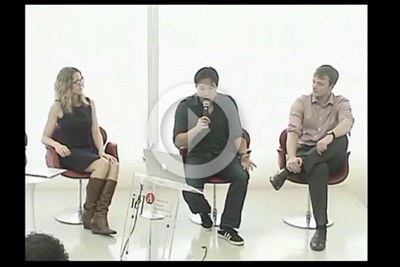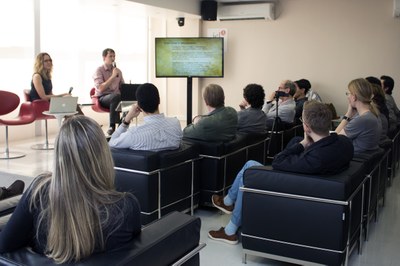Participants of the Intercontinental Academia present results of the event
 The detailed thematic structure of a MOOC (Massive Open Online Course) on time and the prospect of several scientific papers resulting from partnerships between the young researchers that have participated in the Intercontinental Academia are the main outcomes of the first immersion period of the project, held at the IEA-USP from April 17 to April 29.
The detailed thematic structure of a MOOC (Massive Open Online Course) on time and the prospect of several scientific papers resulting from partnerships between the young researchers that have participated in the Intercontinental Academia are the main outcomes of the first immersion period of the project, held at the IEA-USP from April 17 to April 29.
David Gange (University of Birmingham), Nikki Moore (Rice University) and Helder Nakaya (USP), three of the participants, presented the Closing Report to the members of the project's Senior Committee during the last session of the encounter.
INTERDISCIPLINARITY
|
Goals of the MOOC
According to them, the MOOC to be produced will be a kind of interactive online guide for students and researchers who want to develop or expand their interest in the concept of time. For now, there are three name options for the course: "On Time", "Thinking with Time" and "What Time Is It?".
The expectation is that the users of the MOOC acquire skills to synthesize arguments from large areas of knowledge, learn to analyze evidence in order to form their own ideas on the raised issues, develop the ability to deal with conceptual materials and think transversely to the disciplines involved.
Students should collaborate in the construction of scientific knowledge at the same time as they develop their framework of knowledge
Course structure
The young researchers have in mind a MOOC with four central themes chosen after a group evaluation on the key subdivisions of the concept of time.
All content will be studied from 14 topics, 13 of them related to at least one of the four core subjects and involving various disciplines, both the sciences and the humanities. The completion of the course will have an additional topic which will focus on the future of the concept of time.
Core subjects
Is time essential or a cognitive phenomenon? Does it require change? What exists in time? Is time an independent entity as suggested by physics and philosophy? Is it absolute or relative? These questions will try to answer the question of the first central theme: "What is time?".
“How is time perceived?” is the question that defines the second central theme. It raises a number of issues to be studied, including the following:
- Can we perceive time?
- Is it possible to make reliable judgments about temporal properties?
- Can one perceive time without change?
- What is the relationship between experienced time and neural time?
- How is it possible to experience events that last in time (movement, change, succession, melodies) as something extended in time?
The functional concept, the mutant concept and the standardization of time, the mental time travel (chronesthesia), the opposition between linear time and cyclical time, and (in anthropology) between deictic time and sequential time will be analyzed in the third central theme: "How is time conceptualised?".
The question that defines the fourth central theme is "How is time used?". The issues to be discussed approach time as something relevant to subjects such as astronomy, biology, chemistry and medicine as well as how narratives use it creating linearity, circularity or even its fractionation. The importance of time in social interaction (time management, punctuality, working and leisure hours), history, traditions and other aspects also deserve attention.
Topics of study
The 14 topics of the course have been established through specific questions which are broken down into sub-questions:
- How is time measured?
- What traces does time leave?
- Is there a relationship between time and causality?
- Is time relative?
- What are temporal illusions and what can we learn from them?
- Does time have a history?
- Why is the present special?
- Can we predict the future?
- How do different rhythms interact?
- What does symbolic representation do for human understanding of time?
- Do non-humans have individual time?
- Is time running out?
- How do we value time?
- What is the future of the time concept?
Related materialINTERCONTINENTAL ACADEMIA Conclusion report by the participants
News "Intercontinental Academia Conference Proposes Philosophical Reflection on Time and Eternity" |
Means
Each topic will be covered in a class which will feature videotaped speeches, animations, questions and 5-8 films of 7-15 minutes each.
There will be a discussion forum in which the students will be encouraged to provide answers on questions raised by the course and other students.
There are also plans for a multimedia reading list, a kind of database with links and relevant content separated by levels of complexity. The idea is that students can write short comments on the presented material's support itself.
Target audience
The MOOC will be designed at a level of scientific complexity that should be "suitable for intellectually ambitious graduates." However, it will not be necessary that the students have previous specific qualifications as this would not match the diverse academic profile of those responsible for the initiative, who do not have an area of common knowledge to everyone. It would also be incoherent with the general spirit of this type of course.
The introduction of complex ideas will be made from the basic concepts domain, since each student is a beginner in at least some of the subjects comprised in the MOOC.
 Additional results
Additional results
Biologist Helder Nakaya presented the potential additional results that the Intercontinental Academia can provide besides the MOOC.
The first one is to send a "letter to the editor" of some interdisciplinary journal of world prestige. This contribution will address the importance, the key features and the project's results.
Even the contact of the young researchers throughout the project should result in interdisciplinary scientific articles, which might also be possible from the processing of the data to be collected through questionnaires answered by the students of the MOOC.
The production of a video with various multimedia features on all the work being developed in the Intercontinental Academia will be considered.
